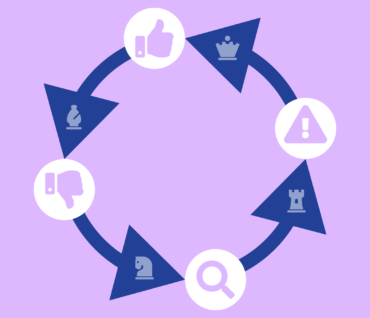
Get Started
Graphite's supplier management tool helps you onboard faster, cut time on risk reviews and streamline supplier validations. Save time and money.
November 12 2023
What is Tail Spend in Procurement?
Your procurement department juggles plenty of responsibilities, from negotiating contracts and onboarding new suppliers to ensuring cost savings. But there’s an uninvited guest at your table, often lurking in the shadows—tail spend. So, what is tail spend in procurement?
Tail spend is the silent budget killer that sneaks into your organization, siphoning off valuable resources that could be invested more strategically. These often-overlooked, one-off purchases can lead to overspending and missed cost-savings opportunities.
So, what can you do to better manage tail spend? How do you put in place processes for tail spend optimization?
While this type of tail spend performance can be harmless in small doses, the ability to effectively manage tail spend can become a key competitive advantage for your organization.
For example, when the economy is experiencing a downturn and cost-cutting is a priority, the best savings opportunities lie in indirect spend areas like tail spend. Procurement teams must recognize those areas where they could be using resources inefficiently and leaving money on the table due to low-value spending.
This article will answer in detail what is tail spend in procurement and offer suggestions for strategic tail spend optimization across your business units.
Applying the 80/20 Rule to Tail Spend in Procurement
Have you heard of the 80/20 rule? Originally thought up by 19th-century economist Vilfredo Pareto, this handy tool can help your procurement teams determine where to pay the most attention to get the best bang for your buck and keep things running smoothly.
Here’s how it works: In procurement, 80% of what your company buys comes from just 20% of your suppliers. That’s the 80/20 rule.
The other side of this is the tail spend, where 20% of spending goes to a whopping 80% of suppliers. These are lots of small buys, but they’re from so many different suppliers that it becomes hard to keep track of.
First, let’s get the tail spend definition out of the way:
What is Tail Spend in Procurement?
Tail spend refers to all your organization’s small, low-value transactions, from everyday supplies and maintenance services to travel expenses and IT equipment. Since these tail spend purchases are often scattered across different departments, tracking and managing them effectively can be challenging. In fact, your procurement team may not even be aware of many of these maverick spend purchases, essentially creating a blind spot in your otherwise meticulous internal processes.
But don’t be fooled by the size of these “small” transactions. They may seem insignificant on their own. But when combined, these purchases can quietly drain a sizable chunk of your company’s procurement budget and affect your bottom line more than you might expect.
How Does Tail Spend Differ from Core Spend?
Core spend refers to your organization’s strategic purchases that directly contribute to primary operations or products. These are typically high-value items, such as raw materials for manufacturing or major equipment acquisitions. Usually, these transactions require careful planning, negotiation, and contract management from a few strategic suppliers.
In contrast, long tail spend comprises a high volume of low-value purchases with a higher frequency, often from a number of suppliers. Long-tail spend management is important because these transactions don’t get the same level of scrutiny as core spend, they’re more susceptible to fraud and waste.
Why Do Managers Often Ignore Tail Spend in Procurement
Tail spend doesn’t share the same spotlight as core spend. Many organizations focus on negotiating major contracts and nurturing relationships with key suppliers who provide vital goods and services. As a result, tail spend tends to fall through the cracks.
This neglect can seriously impact your bottom line. The cumulative effect of unmanaged tail spend can lead to inflated costs, inefficient processes, and missed cost savings opportunities. Plus, making informed decisions about cost-saving measures or supplier consolidation is complex without visibility into all spend data.
Real-World Tail Spend Examples
Tail spend isn’t limited to a specific industry or type of purchase. Instead, it’s a pervasive challenge that affects organizations across various sectors.
Here are a few tail spend examples that will give you a better idea of what real-life scenarios look like:
Office Supplies
Imagine the typical office setting with pens, paper, toner cartridges, and other everyday items. These low-value purchases are typically small and infrequent but can add up over time. For example, imagine your company has a contract with Supplier A for office supplies, who offers discounted rates and pre-agreed terms. An employee, unaware of this contract, purchases similar supplies from Supplier B at a higher price and different terms. This action constitutes maverick spend because the employee did not follow the established procurement procedure and instead made an unauthorized purchase that could lead to higher costs and potential contract compliance issues.
IT Accessories
Think about all the IT accessories you buy—like cables, adapters, and connectors. While they may not cost much individually, tail spend can splinter without a consistent procurement process for such small items. This inconsistency might lead employees to buy identical items from a number of suppliers at varying prices, raising expenses and diminishing your control a business unit’s spending. Moreover, this dispersed buying complicates inventory tracking and management.
Maintenance Services
Maintenance demands can be irregular and unforeseen. Picture a facility with diverse systems like HVAC, plumbing, and electrical. Over time, these systems periodically need repairs or upkeep, often from different providers. Managing this assortment of service providers and irregular service requests can take time and effort in terms of cost and complexity.
What’s the Cost of Poor Tail Spend Rationalization?
Poor tail spend rationalization in procurement can lead to several critical challenges for your organization, including:
1. Missed cost savings opportunities
Often, companies incur higher costs for smaller items, which could be significantly reduced with pre-negotiated pricing. Effective tail spend management can yield substantial savings, often amounting to 20-30% of your total indirect spend.
2. Compromised product quality
Beyond just paying more, neglecting tail spend management can also mean a loss of control over product quality. This raises the risk of procuring inferior goods, potentially damaging your company’s good reputation.
3. Increased compliance risks
In industries where regulation is key, lack of oversight over supplier quality and quantity can escalate your compliance risks over issues like conflicting contracts and payment terms.
4. Reduced productivity
Tail spend often involves time-consuming transactional buying that does not contribute value and leads to inefficiency. Studies indicate that up to 40% of buyer and requester productivity can be lost in chasing these smaller purchases.
Addressing these aspects of tail spend is crucial to maintain quality standards, reduce costs, and ensure overall efficiency within your organization.
What Are the Benefits of Strategic Tail Spend Optimization?
When you prioritize tail spend optimization, you can experience these competitive advantages:
1. Significant cost reduction
By effectively managing tail spend, your company can unlock substantial savings. Initially, addressing spending can lead to a one-time reduction of 10 to 20%, with an ongoing annual savings of 2 to 5%. It’s advisable to aim for at least 86% of your total spend to be in the strategically managed category to optimize these savings.
2. Enhanced efficiency and productivity
Consolidating your supplier base leads to greater efficiency and cost reductions. This allows your procurement teams to focus on fewer suppliers and allocate more time to significant contracts that add more value. Technology, such as automation in procurement enables procurement teams to concentrate on tasks that contribute to continuous improvement and potentially boost productivity by up to 20%.
3. Improved compliance and reduced risks
Managing tail spend is crucial role in ensuring compliance with your business policies and contract terms, and reduces the risk of rogue spending. Eliminating unreliable suppliers and making the procurement process more transparent helps prevent fraud. Consider implementing digital procurement systems for managing tail spend to monitor transactions and ensure they align with your company policies and contracts.
With Graphite, your procurement team can create custom workflows to guide requesters to the right channel every time. Plus, you’ll build and maintain stakeholder trust with fast turnaround times and an easy-to-navigate purchasing process.
4. Overall stakeholder satisfaction
When procurement systems are easy to use, internal and external stakeholders are more satisfied. Systems that clarify roles and responsibilities and include points of contact for various issues lead to faster process cycle times and up-skills procurement resources. Graphite’s centralized intake portal and customizable purchasing workflows gives procurement teams the power to centralize and manage spend and strengthen stakeholder relationships without loss of control.
Next up, let’s look at strategies to effectively manage and tame this tail spend beast:
3 Strategies Tail Spend Optimization
Optimizing tail spend in procurement can be challenging, but it’s worth the effort. By analyzing spend data and implementing these strategies, you can gain control of spend, save money, and improve procurement efficiency.
Strategy 1: Consolidate & Aggregate Tail Spend in Procurement
Imagine tail spend purchases scattered everywhere, like a wild shopping spree. What if you could channel them into a single, organized location? This is the power of centralization.
A Central Procurement Hub
Envision a central hub for procurement—a command center where every penny spent, regardless of its magnitude, is meticulously tracked. This centralized approach allows you to effectively manage your spending in one place. The result? A slicker, more efficient and more transparent procurement process with a bird’s-eye view of your company’s spend. Graphite Connect offers a central platform for procurement teams and stakeholders to process purchasing requests, simplifying the entire purchasing process and increasing your team’s ability to manage tail spend swiftly and effortlessly.
Unity Is Strength
By bundling similar products or services and consolidating suppliers, you don’t just declutter—you unlock potential volume discounts, significant cost savings, and competitive advantage. It’s like turning multiple small advantages into one big win.
Strategy 2: Embrace Tail Spend Technology & Automation
In our modern, tech-driven era, leveraging technology to streamline internal processes is essential, especially in procurement functions, where precision matters; having the right technology and automated tools is a game changer.
Shift from Manual to Automatic
Why manually juggle countless key procurement processes when you can let technology do the heavy lifting? Adopting a digital procurement system or procure-to-pay (P2P) solution ensures each transaction fits within your company’s procurement guidelines, regardless of size. Let technology shoulder the burden of streamlining internal processes and ensuring accuracy and compliance every step of the way. Graphite Connect’s Guided Intake feature guides stakeholders with custom, logic-based workflows to eliminate confusion and ensure success. When a purchase request is complete, Graphite automatically triggers tasks and workflows to notify your team.
Focus on Tail Spend Analytics
Venturing into tail spend without spend analytics or a tail spend analysis is like hiking in the wilderness without a map. Big data and the right spend analytics tools can offer you a detailed, clear view of every tail spend expense. These tools not only shine a light on your spending patterns and tail spend data, but also reveal opportunities for cost savings.
Forge Better Connections with Supplier Portals
Managing many small suppliers can feel like herding cats—unless you have a supplier portal. A centralized supplier portal streamlines sourcing and enhances communication between you and your suppliers. With Graphite Connect, you can track orders quickly, evaluate supplier performance, and foster stronger, more transparent relationships—all from a single dashboard.
Strategy 3: Strengthen Governance & Compliance
Tail spend might seem small, but its cumulative impact can’t be overlooked. Smart tail spend optimization ensures that a company’s procurement activities are conducted according to set standards and regulations. By reinforcing governance and compliance, you ensure smoother operations and set up your organization to maximize every procurement opportunity.
Create Your Tail Spend Blueprint
Clarity is king in procurement. Lay down crystal-clear rules for tail spend. A well-defined roadmap makes each procurement action smoother, whether sticking to preferred supplier lists, leaning on pre-set contracts for regular buys, or knowing when to get multiple bids.
Watch for Tail Spend
Stay one step ahead with regular checks on your tail spend. These check-ins catch any unplanned or wasteful spending and keep suppliers honest about their prices. Vigilance in tracking tail spend is key to steering clear of pitfalls.
Knowledge Is Power for Procurement teams
Equip your entire procurement department with know-how. Routine training ensures everyone’s on the same page with procurement rules and ready to make sharp decisions. Highlight the big picture of tail spend and the domino effect of even the smallest slip-ups. Sticking to the rules becomes a breeze when the whole team gets it.
Put these strategies to work and you’ll pocket more cost savings, boost efficiency, and slash risks.
Tackle Tail Spend Optimization with Graphite
Navigating the multifaceted world of procurement and tail spend management demands more than just a tool; it requires a comprehensive solution. That’s where Graphite shines.
At its core, Graphite is a central hub, offering a unified view of your suppliers and total spend. No more sifting through fragmented data or juggling multiple systems to get the needed information. Every crucial detail, from supplier interactions to rogue spending patterns, is securely stored in the Graphite network. This panoramic view not only makes it easier for you to identify potential areas for grouping spend or consolidating suppliers. It also arms you with insights to make informed, strategic decisions quickly.
Graphite’s Guided Intake tool enables your team to build custom workflows to guide purchase requesters through the purchasing process, and you can easily suggest existing and preferred suppliers before requesters select a new supplier.
Say goodbye to tedious, manual procurement processes. Efficiency takes center stage with automated procurement workflows. With Graphite, your key procurement processes are streamlined and accelerated, freeing your team to focus on tasks of more strategic importance.
Graphite’s commitment to governance and compliance sets it apart. Third-party data validations ensure your data is always accurate and reliable. Automated alerts and risk reviews instantly flag potential pitfalls. In a world where compliance is king, Graphite Connect guarantees your procurement and tail spend management strategies are always aligned with industry best practices.
Creating an effective tail spend management program is an opportunity to create real value for your organization. With the right cost saving strategies and tools, you can transform tail spend from a budget drain into a source of significant savings and efficiency.
Ready to Learn More?
Looking to gain greater visibility and control over your tail spend? Learn how Graphite can help you implement your tail spend management program!
Request a Demo



